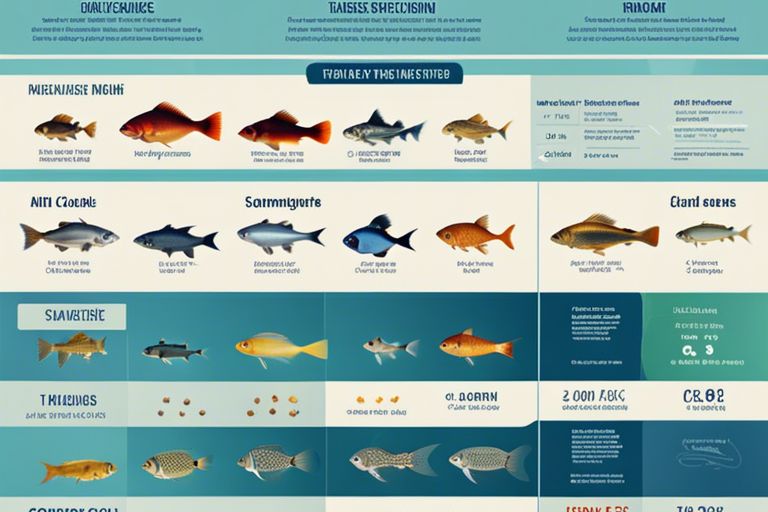With a serene aquarium at your disposal, it’s vital to keep a close eye on your fish friends for any signs of illness. Being able to identify symptoms of fish diseases early can make a huge difference in their health and well-being. From unusual behavior to physical changes, being knowledgeable about what to look for can help you provide timely treatment and ensure a thriving aquatic environment. In this informative guide, we’ll explore common fish illnesses and their symptoms, empowering you to take proactive steps to keep your fish healthy and happy.

Overview of Common Fish Illnesses
Bacterial Infections
To ensure the health of your fish, it is vital to be aware of common fish illnesses they may encounter. Bacterial infections are a prevalent threat to fish health and can manifest in various ways, such as fin rot, body sores, and pop-eye. These infections are often caused by poor water quality, stress, or injuries, making it crucial to maintain a clean and stable environment for your aquatic pets.
Fungal Infections
Common fungal infections in fish can appear as white, cotton-like growth on their skin, fins, or gills. These infections are typically secondary to an underlying issue like poor water conditions, injuries, or stress. To differentiate between bacterial and fungal infections, look for fuzzy growth that resembles mold. Prompt treatment with antifungal medications can help alleviate the symptoms and prevent the infection from spreading to other fish in the tank.
Parasitic Infections
With parasitic infections, external parasites like ich or anchor worms can significantly impact the health of your fish. These parasites are often introduced to the tank through infected fish or contaminated plants. Regularly inspecting your fish for signs of parasites such as white spots, abnormal behavior, or visible worms can help detect and treat the infection early on, reducing the risk of spreading to other tank inhabitants.
Viral Infections
Infections caused by viruses in fish are less common but can still be detrimental if not addressed promptly. Viral infections may present as abnormal growths, lesions, or behavior changes in affected fish. Quarantining infected fish and maintaining optimal water conditions are crucial in controlling the spread of viral infections. Consult a veterinarian or aquatic specialist for proper diagnosis and treatment options to ensure the well-being of your fish.

Early Signs and Symptoms of Fish Illnesses
Behavioral Changes
Early identification of behavioral changes in your fish can be crucial in detecting illnesses at an early stage. Look out for abnormal swimming patterns, lack of appetite, unusual hiding, or aggressive behavior towards tank mates. These signs could indicate underlying health issues that require prompt attention.
Physical Anomalies
Early recognition of physical anomalies in fish is vital for timely treatment. Keep an eye out for visible sores, lesions, discoloration, bloating, or abnormal growths on the body or fins. Any sudden changes in the fish’s appearance should not be overlooked, as they could be indicative of various illnesses.
Anomalies such as odd protrusions, white spots, or red streaks are also red flags that should not be ignored. Regularly inspecting your fish for any physical abnormalities will help in catching potential health issues before they escalate.
Diagnostic Approaches for Fish Illnesses
Water Quality Testing
On a routine basis, testing the water quality parameters of your aquarium is crucial for maintaining the health of your fish. Parameters such as pH, ammonia, nitrites, and nitrates should be regularly monitored using appropriate test kits. Any sudden spikes or deviations from optimal levels can indicate potential illness in your fish.
Visual Inspection Techniques
The visual inspection of fish is a fundamental technique for identifying early signs of illness. It involves observing the fish closely for any abnormal behaviors, changes in coloration, appearance of spots, lesions, or other physical symptoms. Regularly assessing the overall condition of your fish can help in early detection of diseases.
During visual inspections, pay attention to any changes in the fish’s behavior such as decreased activity, lack of appetite, or isolating themselves from the rest of the school. These subtle signs can often be the first indication of an underlying health issue.
Diagnostic
Early detection of fish illnesses is crucial for successful treatment outcomes. By incorporating regular water quality testing and visual inspection techniques into your routine aquarium maintenance, you can proactively identify symptoms of diseases in your fish. Timely diagnosis enables prompt treatment, minimizing the spread of illnesses and improving the overall health and well-being of your aquatic pets.

Prevention and Treatment Strategies
Quarantine Practices
One of the key strategies in preventing the spread of fish illnesses is to implement quarantine practices. Quarantine tanks should be set up for all new fish to observe them for any signs of illness before introducing them to the main tank. This practice helps in early detection and containment of any potential diseases, safeguarding the health of the existing fish population.
Medication and Remedies
Strategies for medication and remedies should be approached with caution. It is important to correctly identify the illness before administering any treatment. Using broad-spectrum treatments can sometimes worsen the condition or harm the fish. Consulting with a veterinarian or a knowledgeable fish expert is advisable to determine the right course of action.
Plus, maintaining good water quality through regular water changes and proper filtration can go a long way in preventing diseases in fish. A healthy diet rich in necessary nutrients also boosts the immune system of fish, reducing the likelihood of illnesses. By combining these preventive measures with early intervention and proper treatment, the overall health and well-being of your aquatic pets can be significantly improved.
Final Words
Taking this into account, identifying symptoms of fish illnesses for early treatment is crucial for maintaining the health of your aquatic pets. By regularly observing your fish for any unusual behavior, physical changes, or signs of distress, you can intervene promptly and provide the necessary treatment. Note, early detection can make a significant difference in the outcome of the illness and increase the chances of a successful recovery. Stay informed about common fish diseases, consult with a veterinarian specializing in aquatic animals if needed, and always follow proper quarantine and treatment procedures to ensure the well-being of your beloved fish.
FAQ
Q: Why is it important to identify symptoms of fish illnesses early?
A: Identifying symptoms of fish illnesses early is crucial to provide prompt treatment and prevent the spread of disease throughout the aquarium.
Q: What are common signs of fish illnesses to look out for?
A: Common signs of fish illnesses include changes in behavior, appetite, appearance, and swimming patterns.
Q: How can I identify if my fish is suffering from a parasitic infection?
A: Parasitic infections in fish can be identified by symptoms such as white spots, flashing, scratching, and abnormal swimming patterns.
Q: What should I do if I suspect my fish is sick?
A: If you suspect your fish is sick, it is important to isolate the affected fish, test water parameters, and consult with a vet or experienced aquarist for proper diagnosis and treatment.
Q: How can I prevent fish illnesses in my aquarium?
A: To prevent fish illnesses, maintain good water quality, quarantine new fish before adding them to the main tank, and avoid overfeeding.
Q: Can stress lead to fish illnesses?
A: Yes, stress can weaken the immune system of fish, making them more susceptible to diseases and illnesses.
Q: Should I medicate my entire aquarium if one fish is sick?
A: It is not advisable to medicate the entire aquarium if only one fish is sick. Instead, quarantine the affected fish and treat accordingly to avoid harming the other tank inhabitants.











